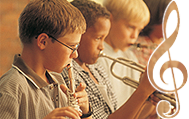Auditory Remediation Program
Submitted by Louise Eddington, Muncie, Indiana
Idea posted 2005-03-15
This program came about one year when our specials schedule miraculously had a few holes in it. The principal wisely suggested that we get something worthwhile in those slots before downtown had other ideas about how to fill them.
After screening in kindergarteners and firsts for those immature souls who had undeveloped listening skills, I met with two or three kids in a group. We played very simple listening games that were aimed at helping these children use auditory clues rather than just visual ones. Some examples:
- Showing them two (and later three to four) rhythm instruments with totally different sounds and letting them try them out. Then I stood behind the piano where they could NOT see them and played one. They had to figure out which instrument it was. If they couldn't say its name, pointing to it was OK.
- Walking, running with the beat of the drum, and stopping on the tone of the bell (or glock). They couldn't see me play the instrument; they could just hear the sound. Since I was standing still and not moving with the circle as I would in class, the students only had auditory clues.
- Making jerky angular movements when I played rhythm sticks and smooth, graceful, sustained movements when I played a smooth recorder melody.
- Once I took the students on a "listening walk" one at a time while blindfolded. (It was a semi-sheer scarf folded, so they weren't totally blind.) I held their hand, we walked around the room, I made sounds (such as shutting a door, running the water in the sink, tapping a drum, turning on the radio, etc.), and they had to identify the sound.
- The shaker-matching game using the film canisters. (See Idea Bank "Film Canister Sound Matching Game")
Everything we did was dependent upon auditory clues and FUN. The kids just thought they were getting out of class to come and play in my room. As to accountability, I documented each child's visit, what they did, and how they did. Not all children made huge progress, but overall I think it helped some to learn to listen better. (We all know how important that is!) I think programs such as these may also cause "higher-ups" to see another value in the fine arts program when it comes to budget cuts. (Did I hear anyone say advocacy?) Here's another way to approach it.
